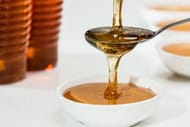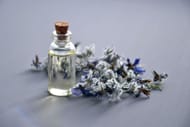Any treatment for canker sores takes at least 2-3 days to work, although many times, canker sores heal on their own with time.
Aphthous ulcers, often known as canker sores, manifest in the mouth and on the gums. Although they are painful and make it hard to speak or eat, most of the times, these sores don't cause permanent harm. Canker sores, in most cases, clear up on their own within a week or two.
There are a number of home remedies and OTC items that can aid the healing process, but none of them are miracle workers. Canker sores are notoriously difficult to treat, and it's unlikely that any solution will work overnight. Hence, any treatment for canker sores can take anywhere between 2-7 days to work.
Caution should be exercised when using any remedy for canker sores because many of them haven't been well researched. If you still have concerns, you may always give your nearest clinic a call.

Symptoms of Canker Sores
Before coming to any treatment for canker sores, let’s look at the symptoms of canker cores:
1) Minor Canker Sores
The most common kind of canker sore is a small one. Although painful, they often disappear within a week or two without leaving any scars.
Minor canker sores typically cause the following symptoms:
- pain with chewing, swallowing, or speaking,
- a tingling or burning feeling, and
- small, oval-shaped pimples inside the mouth
2) Major Canker Sores
Major canker sores are more serious and less common than mild canker sores. There is a chance of scarring, and it might take up to four weeks for them to heal.
Large canker sores manifest as mouth sores that are quite noticeable and might cause discomfort when eating, drinking, or talking.

How Do You Get Canker Sores?
A combination of factors causes canker sores, even in the same person. Understanding the underlying cause for canker sores goes a long way in helping to figure out the treatment for canker sores. Check out some common causes below.
- Accidental cheek biting, overzealous brushing, minor injury from dental work, and sports-related mishaps can all cause canker sores
- Sodium lauryl sulfate-based toothpastes and mouthwashes
- Sensitivities to various foods, such chocolate, coffee, strawberries, eggs, nuts, cheese, and hot and sour dishes
- Zinc, folate, Vitamin B-12, or iron deficiency
- Mouth infections caused by an allergic reaction to common oral bacteria
- The peptic ulcer-causing bacterium Helicobacter pylori
- Changes in hormone levels around menstruation
- Emotional distress

Treatment for Canker Sores
The following home remedies are often used as treatment for mouth sores.
1) Alum Powder
Alum powder is often used as a treatment for canker sores to help dry them out. Potassium aluminum sulfate is the main ingredient in alum powder.
To use:
- Mix a small amount of alum powder with a little bit of water to make a paste.
- Put a dab of the paste on your canker sore.
- Keep the paste on for at least 1-3 minutes.
- Just give your mouth a good rinse.
- Do this every day until the canker sore heals.
2) Saltwater Rinse
Curing oral problems with saltwater rinse has long been a popular remedy. You'd be surprised to learn that saltwater rinse is also considered a common treatment for canker sores, albeit a painful one.
To use:
- Mix 1/2 cup of hot water with 1 teaspoon (tsp) of salt.
- For 15-30 seconds, gargle with this solution before spitting it out.
- Repeat as often as every several hours.

3) Honey
Honey has been used as a treatment for canker sores for ages. It has anti-bacterial and anti-inflammatory properties that help with this problem.
It is recommended to use honey four times a day directly on the wound. It's important to note that most commercially available honey has been pasteurized, which loses most of its nutritional value. Manuka honey is a type of raw, unpasteurized, unfiltered honey that can be used on canker sores.
4) Baking Soda Rinse
Canker sores may heal faster after using baking soda, which is believed to help by restoring the body's pH balance and decreasing inflammation.
To use:
- Dissolve 1 tsp of baking sode in 1/2 a cup of water.
- For 15-30 seconds, gargle with this solution before spitting it out.
- Repeat as often as every several hours.
Though ingestion of baking soda won't hurt you, you should probably try to avoid it due to its intense saltiness.

5) Coconut Oil
Coconut oil's high lauric acid content has been linked to its antibacterial effects, and it is often used as a treatment for canker sores. Canker sores are often caused by bacteria, and this may help treat them and stop their spread. Due to its anti-inflammatory properties, coconut oil may also be useful in alleviating swelling and discomfort.
Just slather some coconut oil on the affected area and you're good to go! Repeat several times a day as necessary until the canker sore has healed.
There is usually no need to worry about canker sores. They almost never have long-lasting consequences.
However, if the sores are more than 3 cm in diameter, new ones appear before the old ones have healed, and they haven’t healed in two weeks, you should visit a doctor and find the right treatment for canker sores that best suit your case.
